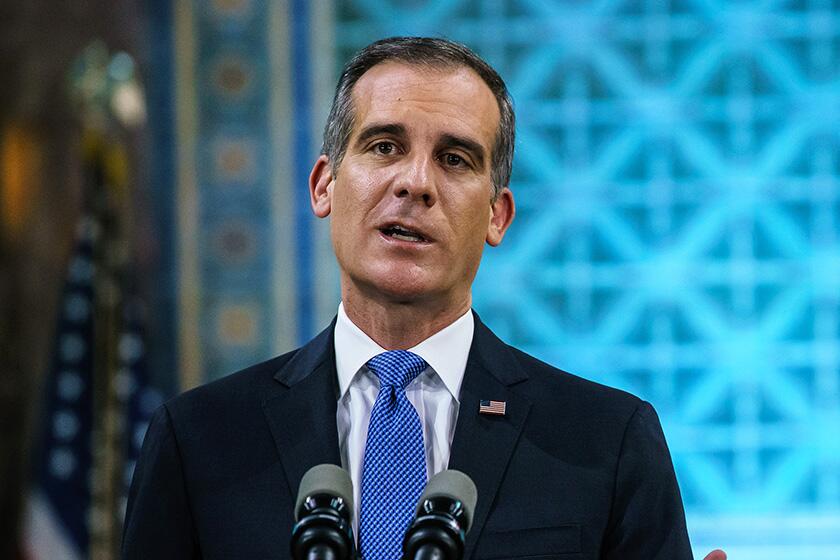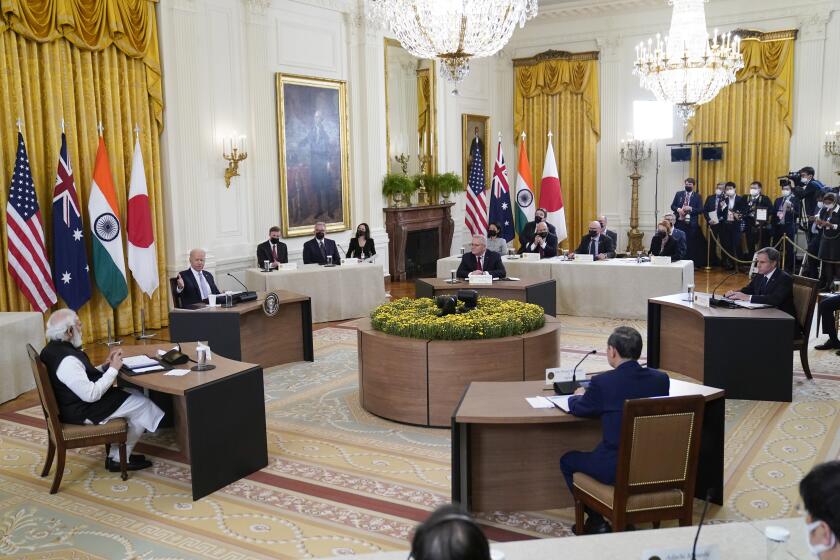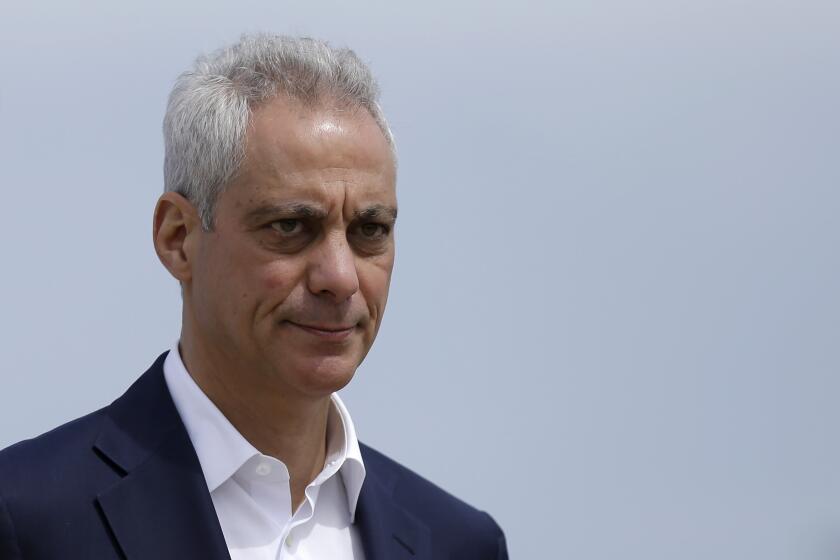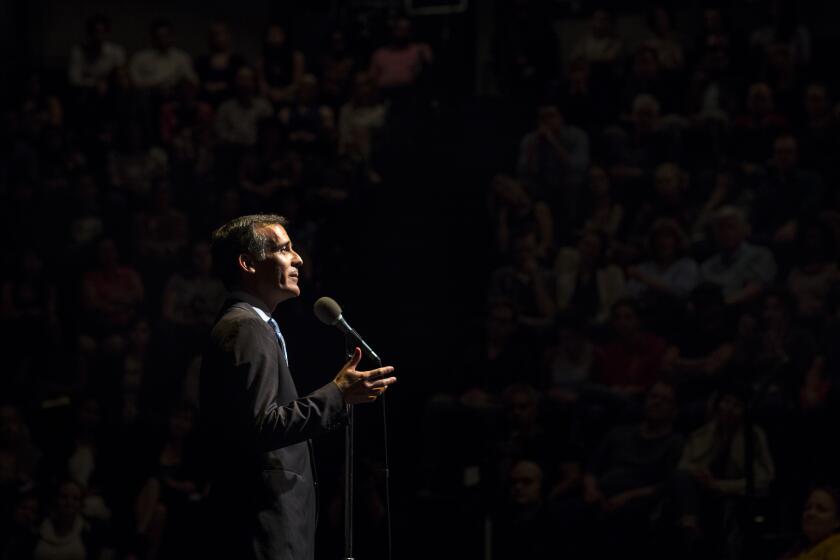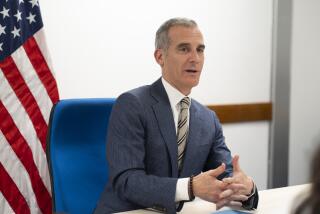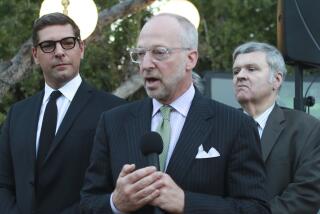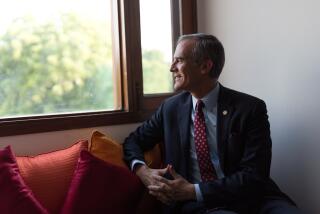Why make Eric Garcetti ambassador to India?
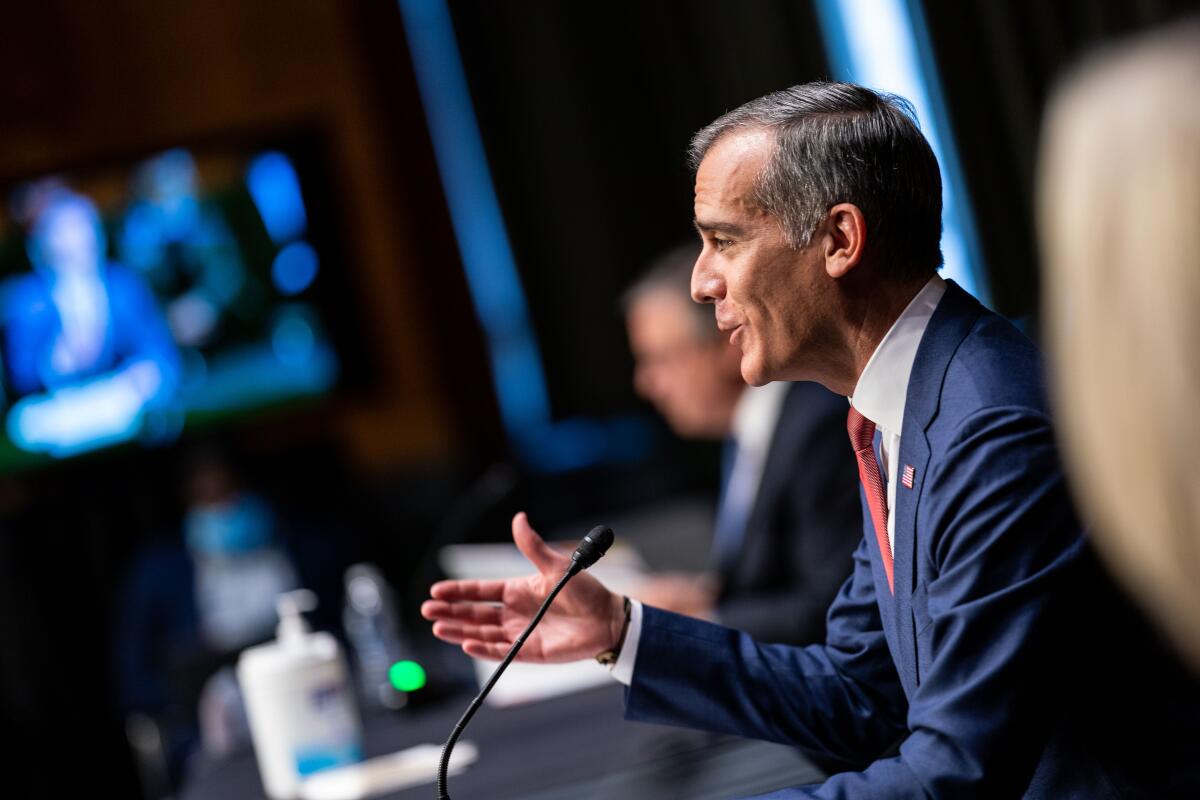
- Share via
This week the Senate Foreign Relations Committee held a hearing on L.A. Mayor Eric Garcetti’s nomination to be the U.S. ambassador to India. Why Garcetti? And why India?
Garcetti was an early supporter of Joe Biden’s 2020 presidential run, but the mayor’s political star has been dimmed by sexual harassment allegations leveled at his aide Rick Jacobs. Meanwhile, as the city’s festering homelessness crisis has increasingly become the defining feature of Garcetti’s mayorship, it’s clear why he would want to take a break from elected office.
For Garcetti, a high-profile ambassadorship is a reasonable path of retreat from his lackluster stint as mayor; for Biden, a plum ambassadorship is a reasonable way to pay his political debts to the mayor.
But India?
Los Angeles Mayor Eric Garcetti will have a confirmation hearing for his nomination to be ambassador to India before the Senate Foreign Relations Committee on Tuesday.
Garcetti is an affable, progressive Latino, Jewish, Italian American mayor. All those characteristics have helped him tremendously in the tapestry of Los Angeles. None of that fits India. (Alternatively, Garcetti would be the perfect ambassador for Argentina — a big Latin American nation that has a rich Italian heritage, a significant Jewish population and that legalized same-sex marriage in 2010.)
And there are risks for Biden in sending our mayor to the subcontinent.
It’s clear that the president understands authoritarianism, especially the Chinese variety, as the principal challenge facing democratic societies. Biden’s views on China and its leader, Xi Jinping, aren’t that different from Trump’s. What is different is that Biden knows how to play the long-term geopolitical game, and an India-U.S. alignment is part of that strategy.
One of Biden’s earliest actions as president was to meet with “the Quad” — Australia, India, Japan and the U.S. — rightly understood in Washington and Beijing as a loose bulwark against China.
The Biden administration is building a Cold War-style web of alliances to contain China. Will China strike back?
And the need for a robust U.S.-India partnership goes beyond confronting China. Simply put, one of the historic shortcomings of American foreign policy has been our failure to build binding ties to India, the world’s largest democracy. Biden seems intent on fixing that — and that goal colors his actions.
In May, people in international trade were stunned when Biden announced he would support a waiver of patent rights on COVID-19 vaccines at the World Trade Organization — a proposal made jointly in 2020 by South Africa and India. In late April, as India slid into the COVID storm, Biden and Indian Prime Minister Narendra Modi had had a phone call in which Modi raised the issue. The U.S. shift toward negotiating a waiver on vaccine rights came just days later — it wasn’t a policy decision about patent law; it was a political decision to support the India-U.S. partnership.
Similarly, Biden’s decision to withdraw from Afghanistan is understandable on its own terms, but it also clears the way for more India-U.S. military collaboration: Exiting Afghanistan means the U.S. has less need for help from Pakistan, India’s most immediate adversary.
Considering all that, sending Garcetti to India seems especially strange. True, the U.S. has often slotted well-known political figures into high-profile ambassadorships. For example, the Senate is soon expected to confirm former Chicago Mayor Rahm Emanuel as the new U.S. ambassador to Japan.
Based on Emanuel’s time as mayor of Chicago, giving him a plum position in the administration is a slap in the face to voters who care about police reform.
But there is a big difference between these two big-city mayors. As chief of staff to President Obama, Emanuel had daily doses of international policy and politics as part of his job. In contrast, Garcetti is a skillful California pol with relatively little international experience. And when you send even a smart, able politician into high-stakes international work for the first time, you take a big risk — you may get outcomes like Vice President Harris’ “do not come” press conference in Guatemala.
So what is Biden thinking?
Well, bluntly put, ambassadors aren’t nearly as important these days as they were decades ago, and the higher the profile of the ambassadorship, the less operationally important it tends to be for U.S. policy.
Many ambassadorial posts are largely ceremonial. For example, the U.S. ambassador to France is traditionally a big political donor, an “ambassadonor.” That person’s job is to throw lovely receptions at the ambassadorial residence — and stay out of the way of detailed Franco-American policy coordination, whether on Islamic insurgents in Mali or vaccination requirements for transatlantic travelers.
Where U.S. ambassadorships really count is with medium and small countries — places such as Botswana, Ecuador, Malaysia, Bolivia, Rwanda, Uruguay — where the ambassador truly serves as America’s eyes and ears. And that’s where we send our career diplomats.
It’s unlikely the next mayor of Los Angeles will be any better than Garcetti at working the governmental machinery of this wayward city.
For larger countries, key U.S. partners and multilateral organizations, our day-to-day international relations have become increasingly conducted by specialized agencies.
In the case of New Delhi, trade issues between the U.S. and India are handled by the U.S. trade representative and the Indian Ministry of Commerce and Industry; research cooperation may be through our National Science Foundation and India’s new National Research Foundation; military issues are coordinated by the two countries’ armed services; cooperation in fighting the pandemic involves an alphabet soup of Indian and U.S. agencies led by the CDC and India’s National Centre for Disease Control.
So, Eric Garcetti to New Delhi? It sends a signal to the Indian people that they are important enough to have as an ambassador a major Biden political ally. And Garcetti gets a posh job as the friendly face of America. We should expect that he’ll learn his portfolio quickly, work hard to avoid any embarrassments and — better than being mayor — he won’t be called upon to make any tough decisions.
Justin Hughes teaches international law at LMU Loyola Law School. In the Obama administration, he was chief negotiator for the Beijing Treaty on Audiovisual Performances and the Marrakesh Treaty for the Blind. He is also a visiting professor at Oxford University.
More to Read
A cure for the common opinion
Get thought-provoking perspectives with our weekly newsletter.
You may occasionally receive promotional content from the Los Angeles Times.
